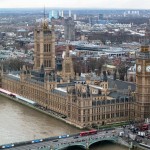 The Brexit referendum highlighted the often chronic over-centralization of British life, with regions untouched and unloved by Westminster registering their discontent in dramatic fashion. While the Conservative government has pledged to “level up” the country, a recent report from the University of Cambridge highlights how the country remains an incoherent web of institutions that result in a “democratic deficit” for many places.
The Brexit referendum highlighted the often chronic over-centralization of British life, with regions untouched and unloved by Westminster registering their discontent in dramatic fashion. While the Conservative government has pledged to “level up” the country, a recent report from the University of Cambridge highlights how the country remains an incoherent web of institutions that result in a “democratic deficit” for many places.
Despite the hurdles, the idea of devolution, which entails conferring authority from central government to local leaders, has gained momentum, with the current government under Sunak offering “trailblazer” accords to mayors. Likewise, the Brown Review, commissioned by the Labour party, has proposed a far-reaching plan to empower communities.
Meaningful devolution
The authors call for “meaningful devolution” to occur in England by 2030, with this only possible if considerable changes to central government are delivered, including a new Office for England department in Whitehall with a Secretary of State, and an “English Devolution Council” to give voice to the various metro mayors across the country.
“There is palpable disillusionment with the grip of the London-centric UK government, especially when you travel further away from Westminster,” the researchers explain. “This has created a powerful current of democratic disenchantment.”
“There is a strong case for a new Office for England along with a cabinet committee, to bring greater cohesion to English governance within Whitehall, and oversee long-promised devolution.”
The need for coherent policy
The report suggests that attempts at devolving power have suffered due to decades of policy churn in Westminster, with this resulting in clashes between education commissions, NHS care boards, local authorities, and so on.
Although certain services clearly rely on each other, their boundaries often conflict. This can be observed in the relationships between entities such as law enforcement and the National Health Service, or fire and rescue services, and also between environmental agencies and forestry commissions.
“Every department and agency seems to be using a different territorial map of England,” the authors continue. “This is a huge barrier to revitalizing deprived places, and a major constraint on local economic development across England.”
Two-tier system
England’s governance system is a patchwork quilt, with a clear divide between those regions utilizing a two-tier system and those relying on a single local authority. A number of areas are also subject to Combined Authorities, which exercise varying degrees of control over transport or housing, in addition to networks of “Local Enterprise Partnerships”.
Despite these efforts at decentralization, two-thirds of residents lack representation at the neighborhood level, as parish councils cover a significant portion of England’s landmass but only represent 36% of its population.
Adding to this confusion is the false impression that Whitehall’s largest departments are UK-wide in scope. In fact, many of these departments have been almost entirely dedicated to England since devolution of power to constituent UK nations.
For instance, the Department for Education is now exclusively “English”, while just a tiny fraction (3%) of the Department for Environment, Food and Rural Affairs’ budget is earmarked for non-English responsibilities.
Similarly, the Department for Health and Social Care only spends 0.5% of its budget outside of England. Even the Home Office now mostly deals with England and Wales. Despite these facts, major government departments are still promoted as core components of the UK state, with scant mention of England in official communications.
Over-centralization
England’s political landscape suffers from “incoherence”, which has contributed to a sense of democratic disenfranchisement among its residents. In fact, local election turnout in England has not surpassed 50% in the last half century and has only occasionally reached 40% in the past 25 years, which is notably lower than Scotland, Wales, and Northern Ireland since devolution.
Compared to nations with similar economic strength (such as France and Italy), culture (such as Ireland), and even those with greater local autonomy (such as Sweden and Finland), local election turnout in England has been far lower since the 1970s. According to the report, “local councils in England are excessively accountable upwards to Whitehall,” leading to a weak connection with the public and a decrease in participation levels in local elections.
England’s centralized system of governance puts it on par with smaller nations, such as Finland and Latvia, in terms of centralized control despite having a population of 55 million people. Apart from Turkey, England is the only large nation in the OECD to have such a centralized system of government. This report underscores the need for greater localization of authority and funding in England to provide a more responsive and accountable government to its residents.
“The British system has at its heart a power-hoarding culture, and centralization is a deeply-rooted reflex,” the researchers continue. “Its constitution makes Westminster supreme.”